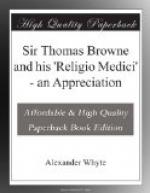for before his fall, it is thought man also was immortal;
yet must we needs affirm that he had a different essence
from the angels; having, therefore, no certain knowledge
of their natures, it is no bad method of the schools,
whatsoever perfection we find obscurely in ourselves,
in a more complete and absolute way to ascribe unto
them. I believe they have an extemporary knowledge,
and upon the first motion of their reason do what
we cannot without study or deliberation; that they
know things by their forms, and define by specifical
difference what we describe by accidents and properties;
and therefore probabilities to us may be demonstrations
unto them: that they have knowledge not only
of the specifical, but numerical forms of individuals,
and understand by what reserved difference each single
hypostasis (besides the relation to its species) becomes
its numerical self. That as the soul hath power
to move the body it informs, so there is a faculty
to move any, though inform none; ours upon restraint
of time, place, and distance; but that invisible hand
that conveyed Habakkuk to the lions’ den, or
Philip to Azotos, infringeth this rule, and hath a
secret conveyance, wherewith mortality is not acquainted.
If they have that intuitive knowledge, whereby, as
in reflection, they behold the thoughts of one another,
I cannot peremptorily deny but they know a great part
of ours. They that to refute the invocation of
saints have denied that they have any knowledge of
our affairs below, have proceeded too far, and must
pardon my opinion, till I can thoroughly answer that
piece of Scripture, ’At the conversion of a
sinner the angels in heaven rejoice.’
I cannot with those in that great Father securely interpret
the work of the first day, fiat lux, to the
creation of angels, though I confess there is not
any creature that hath so near a glimpse of their
nature, as light in the sun and elements. We
style it a bare accident, but where it subsists alone
it is a spiritual substance, and may be an angel:
in brief, conceive light invisible, and that is a spirit.
I could never pass that sentence of Paracelsus, without an asterisk, or annotation; Ascendens constellatum multa revelat, quaerentibus magnalia naturae, i.e. opera Dei. I do think that many mysteries ascribed to our own inventions have been the courteous revelations of spirits; for those noble essences in heaven bear a friendly regard unto their fellow-nature on earth; and therefore believe that those many prodigies and ominous prognostics which forerun the ruins of states, princes, and private persons are the charitable premonitions of good angels, which more careless inquiries term but the effects of chance and nature.




